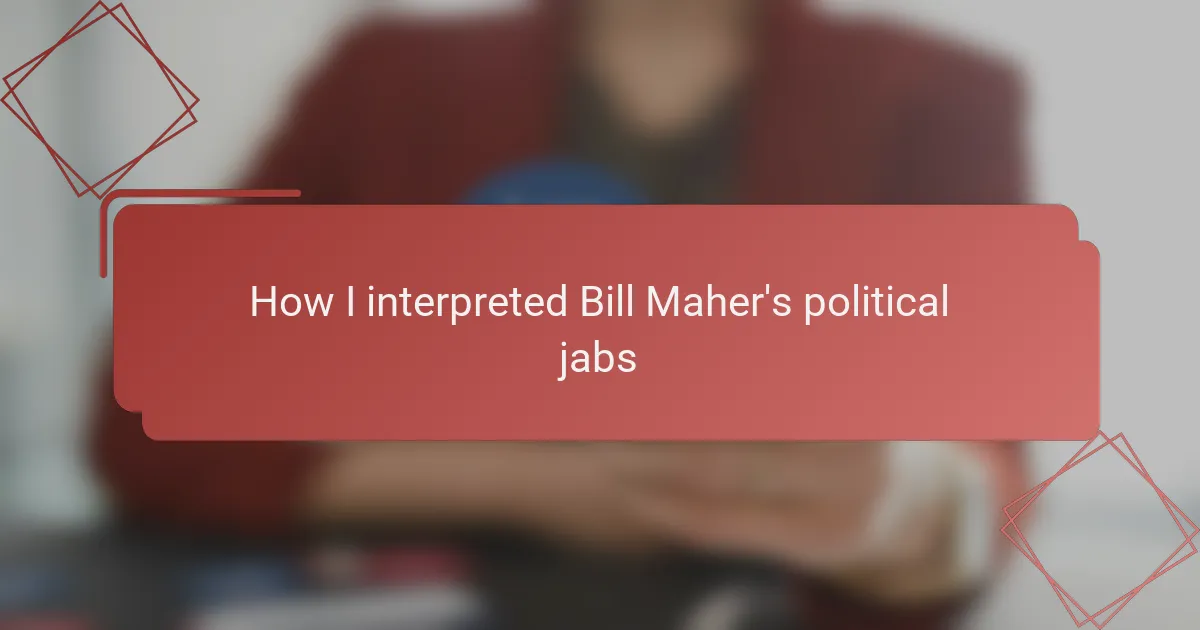Key takeaways
- Political satire, particularly by Bill Maher, utilizes humor and irony to encourage critical thinking and address political contradictions.
- Maher’s style is characterized by bluntness and sharp wit, provoking emotional and intellectual responses while challenging conventional narratives.
- Common themes in his satire include a focus on hypocrisy, skepticism towards political extremes, and an emphasis on personal responsibility in societal issues.
- Incorporating humor into political discussions can lower tensions and foster openness, making difficult topics more approachable.
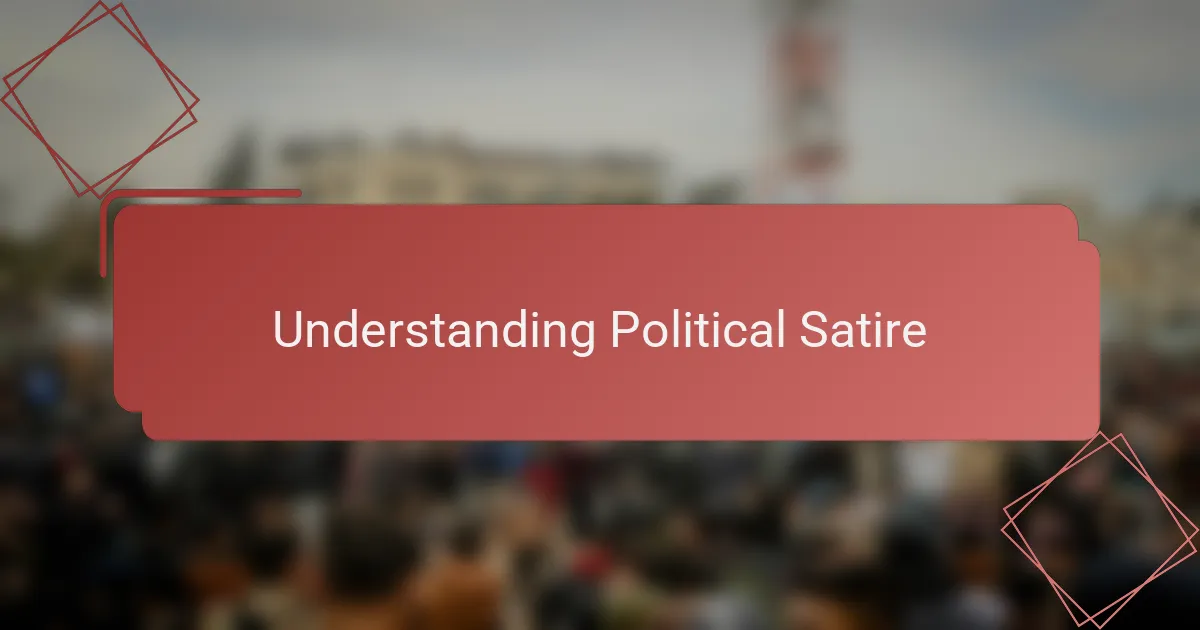
Understanding Political Satire
Political satire is a unique form of commentary that uses humor, irony, and exaggeration to scrutinize political events and figures. When I first encountered Bill Maher’s jabs, I realized that understanding satire requires reading between the lines—not simply laughing at the surface joke but grasping the underlying critique he’s making about the political landscape.
From my experience, appreciating political satire means recognizing its power to provoke thought and challenge the status quo. It’s not always comfortable; sometimes his barbs hit close to home and spur reflection. This emotional response, I believe, is what makes satire effective—it engages both the mind and the feelings.
- Uses humor to highlight political contradictions
- Employs exaggeration to emphasize flaws in policies or politicians
- Encourages critical thinking about current events
- Provokes emotional reactions that foster deeper engagement
- Blends entertainment with insightful social commentary
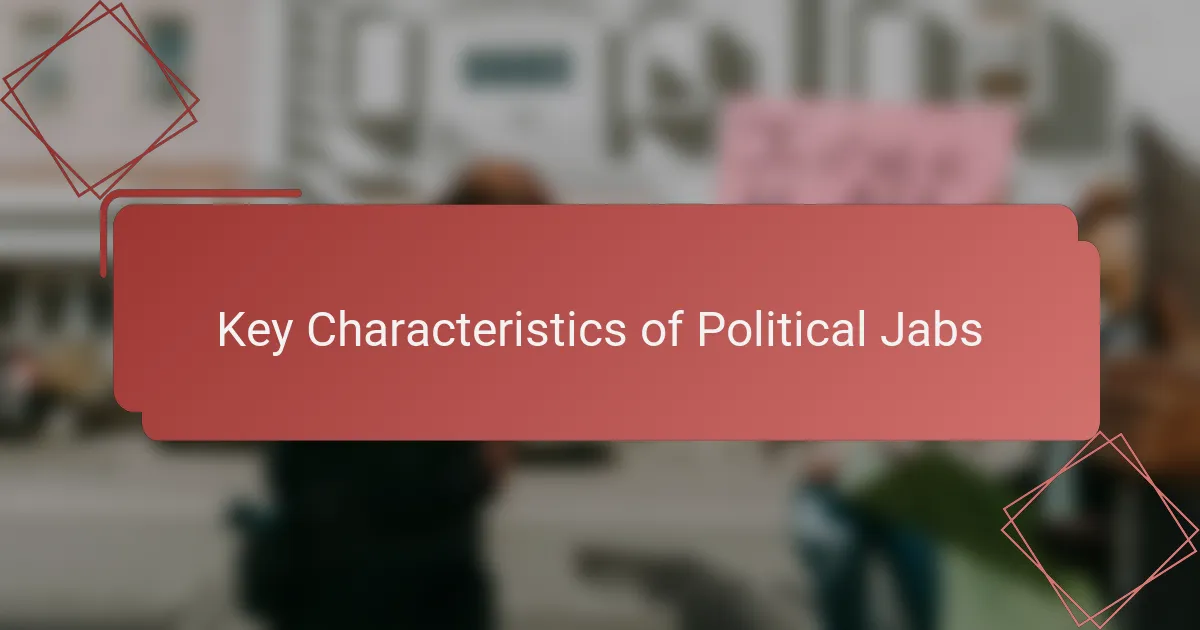
Key Characteristics of Political Jabs
Political jabs, especially those delivered by Bill Maher, often blend sharp wit with keen political insight. From my experience watching his shows, I’ve noticed how he uses humor not just to entertain but to highlight contradictions and hypocrisies in political behavior. This approach makes complex issues more relatable, while sometimes provoking strong emotional reactions because they hit close to home.
What stands out the most in Maher’s jabs is their timely nature and carefully crafted delivery. They don’t just aim for laughs but aim to spark reflection or even discomfort, which I find compelling. His humor often carries an undercurrent of frustration or disbelief, which I think resonates with viewers who feel similarly about political absurdities.
- Clever use of irony and sarcasm
- Targeting political hypocrisy and inconsistencies
- Timely and relevant to current events
- Balancing humor with serious critique
- Provoking emotional and intellectual responses
- Using personal anecdotes or popular culture references to connect
- Encouraging critical thinking through satire
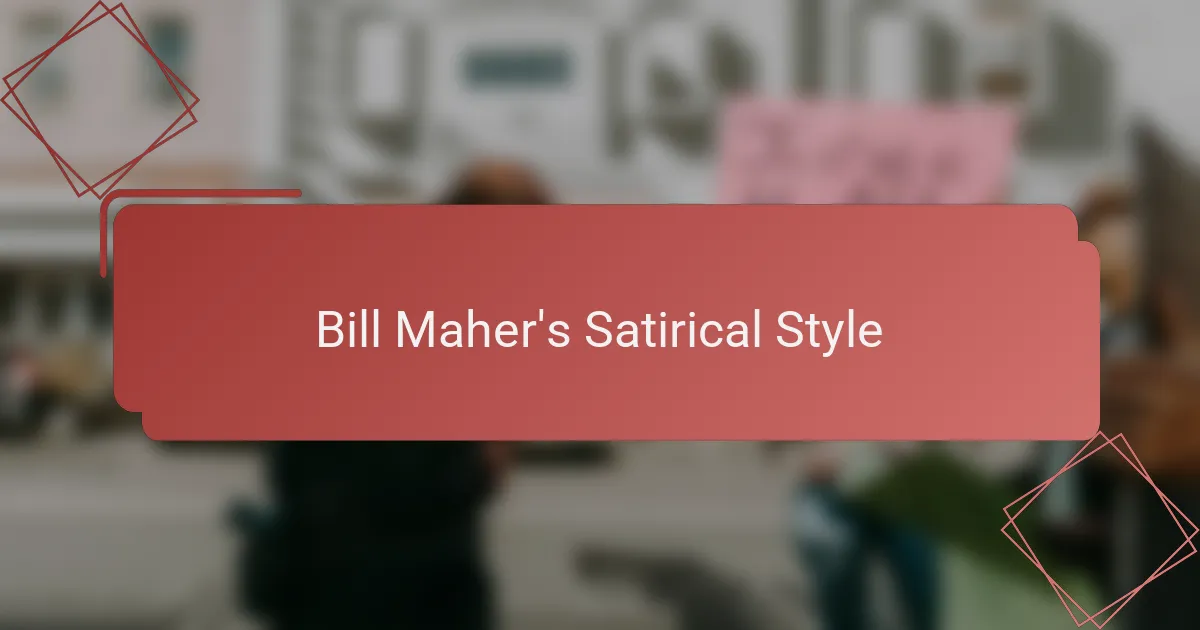
Bill Maher’s Satirical Style
Bill Maher’s satirical style hits a unique blend of sharp wit and unapologetic bluntness. From my experience watching his shows, his jabs often carry an edge that challenges conventional political narratives, making me both laugh and cringe at the same time. His approach feels like a wake-up call wrapped in humor, pushing viewers to rethink rather than just react.
Comparatively, Maher’s style stands out when stacked against other satirists who might opt for gentler tones or subtler critiques. His use of direct language and willingness to tackle controversial topics head-on can sometimes feel intense but always thought-provoking. I appreciate how his satire doesn’t just entertain; it provokes reflection, even if it ruffles some feathers along the way.
| Aspect | Bill Maher’s Style |
|---|---|
| Tone | Blunt, sharp, unapologetic |
| Focus | Controversial and current political issues |
| Humor Type | Witty, often biting sarcasm |
| Audience Reaction | Provokes thought, sometimes discomfort |
| Comparison to Other Satirists | More direct and confrontational |

Common Themes in Maher’s Politics
One theme I keep noticing in Maher’s political jabs is his relentless focus on hypocrisy. It’s like he has this radar for when politicians say one thing but do another, and he doesn’t hold back in calling it out. Watching him, I often find myself nodding along, wondering why such contradictions aren’t addressed more seriously in mainstream discourse.
Another common thread is his skepticism toward political extremes. Whether it’s the left or the right, Maher doesn’t spare anyone from critique. I’ve seen moments where his critiques made me question my own leanings—have I been too quick to defend one side without acknowledging its flaws? That kind of balanced skepticism feels rare and refreshing in today’s polarized climate.
Then there’s his emphasis on personal responsibility mixed with societal critique. I remember watching a segment where Maher challenged both public figures and audiences to take ownership of their roles in political outcomes. It struck me how he blends humor with a call to action, making the message stick without preaching. Doesn’t that make his satire feel more meaningful than just jokes for laughs?

Analyzing Specific Jabs
Bill Maher’s wit often hits with precision, and when I listened to his jabs, I couldn’t help but recall my own moments of frustration with political doublespeak. One particular quip about bipartisan hypocrisy struck a chord, reminding me of a heated debate I once had where facts seemed to disappear in the fog of party loyalty. His ability to pinpoint these contradictions encourages us to question not just the politicians but our own biases too.
Here are some of the sharper jabs that stood out to me:
– His remark on politicians promising change but delivering the status quo felt like a direct mirror to my cynicism about endless campaigns.
– The joke about media complicity made me reflect on how often news serves spectacle over substance, something I’ve grown increasingly wary of.
– Maher’s dig at political consultants reminded me of the last election cycle, where scripted talking points drowned out genuine dialogue.
– His satire on voter apathy touched a nerve, as I’ve witnessed how complacency can silently alter the democratic process.
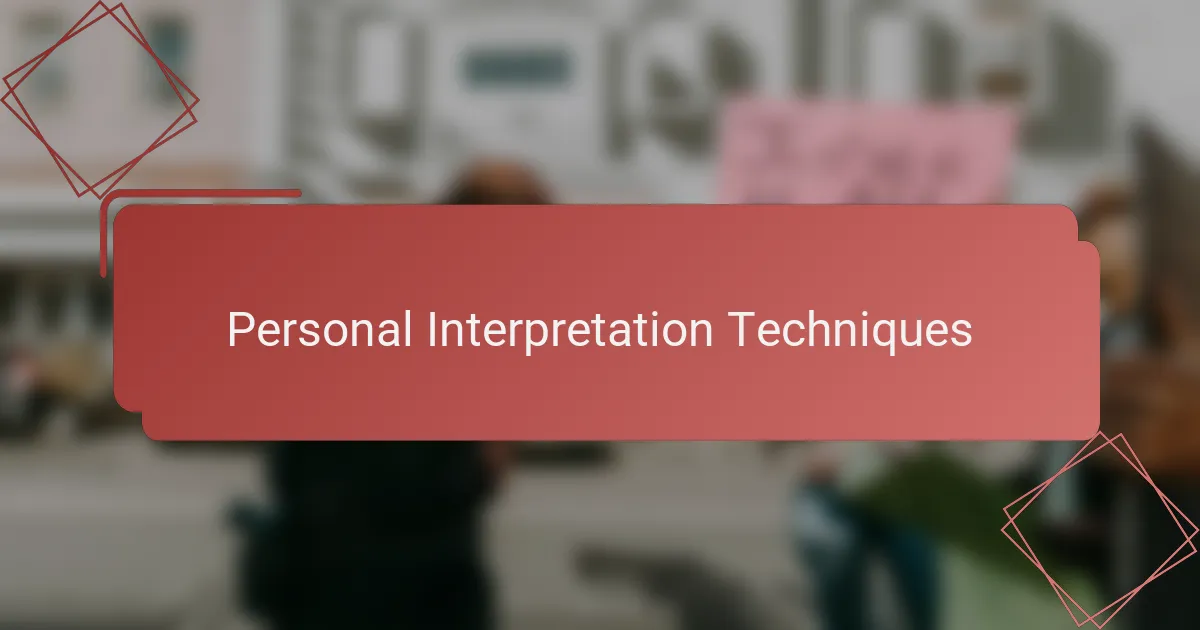
Personal Interpretation Techniques
Personal Interpretation Techniques often involve tuning into the underlying messages rather than just the surface humor. When Bill Maher delivers his political jabs, I find myself dissecting the context, intent, and timing to grasp the full impact. This approach reveals layers of meaning that might be missed with a quick laugh.
One technique I rely on is comparing Maher’s satire with actual political events to see how closely they reflect reality. I remember catching one zinger about campaign finance reform that resonated so deeply because it mirrored frustrations I had felt watching the news. It made the satire not just funny but sharply relevant.
| Technique | Personal Insight |
|---|---|
| Context Analysis | Helps me connect jokes to current political climate, adding depth |
| Historical Comparison | Reveals patterns and recurring themes in political satire |
| Emotional Response | Engages me personally, making satire more impactful |

Applying Insights to Political Discussions
Applying insights from Bill Maher’s political jabs has reshaped how I engage in political discussions. I’ve noticed that bringing humor into debates often lowers tensions, making it easier to address tough topics without triggering defensiveness. It’s interesting how Maher’s sharp wit invites reflection while still entertaining, something I now try to emulate in conversations to keep them both lively and thoughtful.
Here’s a quick comparison of political discussion styles before and after applying Maher’s satirical approach:
| Discussion Style | Impact |
|---|---|
| Direct, serious debate | Sometimes leads to heated arguments and shut down communication |
| Incorporating Maher-style satire | Fosters openness and invites critical thinking with humor |
